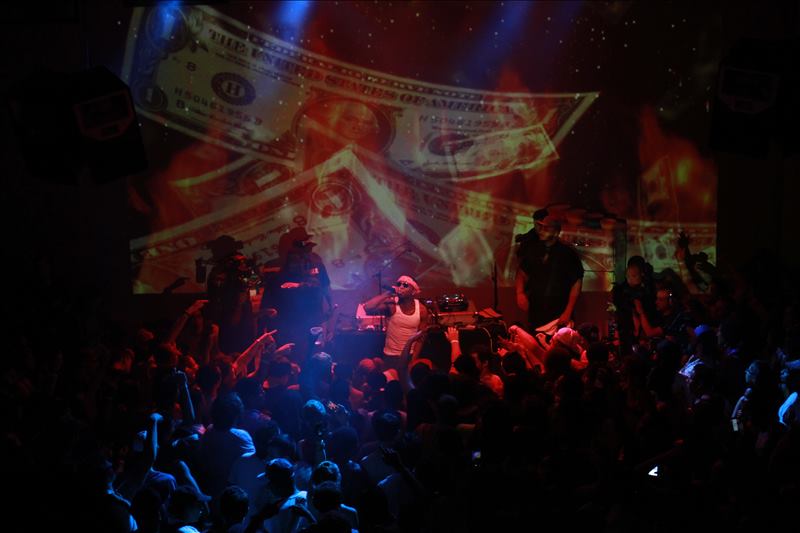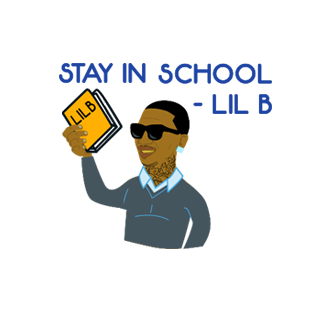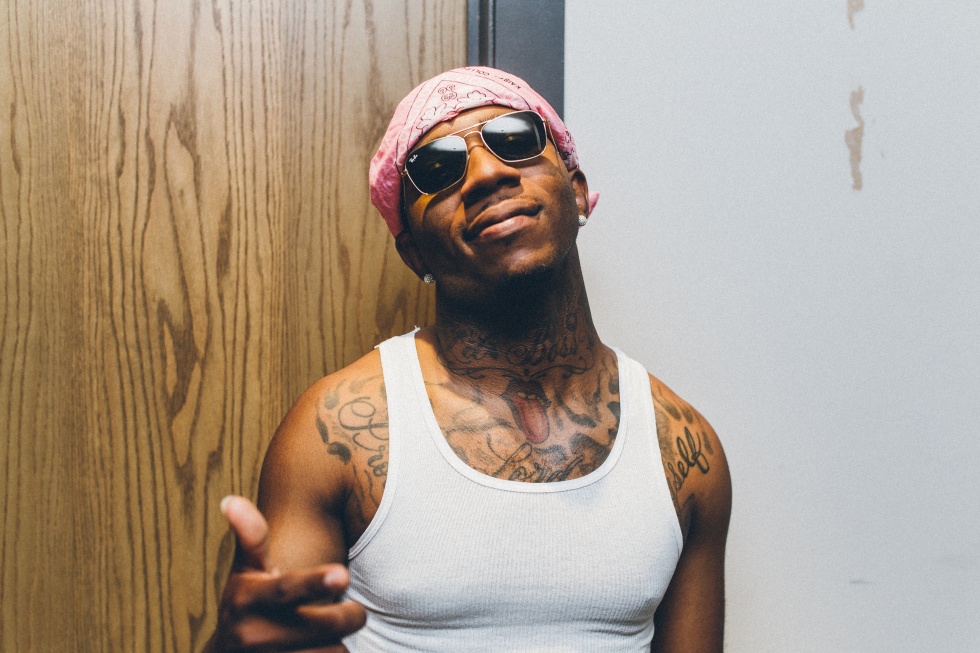“I’m not a rap artist.”
Why even write about Lil B in 2015? Genre godfather, etymological founder, university lecturer, alternative philosophiser, one-time punk poet, and even face of an emoji sticker pack: for the initiated, the point is moot. Forgiving the comparison, the dude has somehow wound up akin to a rapping Tom Waits – if you’re already invested, there’s no need to say a thing. To those not following his constant (and we do mean constant) slew of mixtapes, the adulation can be baffling. If you’re merely clicking on the occasional bizarre news blip, wherein you might find the man donning dresses and spreading curses on hapless NBA players, then the true dominance of Brandon McCartney is lost completely.
Moreover, for a big chunk of seasoned rap heads, his appeal is borderline inscrutable. We’re not here to convert atheists into believers, especially given the man himself doesn’t feel the need to convince. He doesn’t need to fight the system, puff his chest, or hurl rage and insults. He manages so much more, and has been doing so for years – simply through his presence.
But clean off the bat, we need to debunk an affiliation that still carries weight in many minds. Put alongside the seemingly most obvious comparison – the other main beneficiary of rampant, web-propelled hype around 2010-11 (a connection of mutual foolishness which resulted in soft “fuck off”s issued between camps) – reveals something else altogether. The momentarily amusing also-rans of Odd Future have withered away, leaving only a faint trace of their dominance, as the more talented likes of Earl and Frank have wisely distanced themselves further and further. And as for Lil B?
Lil B remains absolutely triumphant.

What makes the Based God different? He’s gregarious, flamboyant and able to court attention with ease, with legions of fans ready and willing to share their proverbial bitches – that much is obvious, but it sells him short. Often dismissed as a bright, witty and deeply entertaining talent who nevertheless lacks ‘skills’, he nonetheless emerged unscathed from clashes with the likes of Joe Budden and David Banner, a supposed lyrical bastion and Southern cultural lord, respectively. Unaffected hardly speaks to the skirmishes: he kicked ass, embarrassing his opponents to the point of irrelevance (go ask who’s taken Budden seriously since).
In fact, Lil B seems capable of coming out clean in any sort of tussle, even versus a dexterous, critical darling such as Freddie Gibbs. His method is deceptively simple, and a key going to the heart of just why Lil B is who he is. B possesses the most ridiculous persona imaginable, a God before Yeezus, and yet also lacks near any sense of pretence. He’s a self-loving geek, unafraid to show all kinds of emotion at all times of day, constantly joking with fans and other more permanent figures within a world he’s wholly content to swerve in and out of. He has no interest whatsoever – let’s be clear, whatsoever – in posturing. This is a guy whose Last.fm display picture depicts him snuggling himself to sleep, and doubtless he wouldn’t change a thing. Put up against another MC (itself a scarcely fitting phrase) hailing from his generation, there’s no genuine counterpart.
The culture of absurdity that permeates not just rap but contemporary music at large is, in its own way, deeply Based.
Forget a hit: the kid doesn’t need one, and clearly couldn’t care less. While the likes of Drake rule the air waves, the hearts of the people are in a clear place. If anything, the comparison is oddly apt (again, a timestamp of how rapidly rap tropes got shook down at the turn of the decade). While rap was still having a collective hissy fit over Aubrey Graham’s entrance, what constituted legitimacy, who should ‘be here’ and who shouldn’t, Lil B was floating about in the clouds, coasting over Evanescence samples with a mix of unadulterated confessions and warning of culture ‘vampires’. In the years since, Drizzy has made countless strides for current stylistic trends, and yet the boy from Toronto has rarely let up on his ‘I am a rap overlord’ boasting. Insisting on dominance when such a reality is already apparent wears thin real quick. All the while, B stays cruising content down his own lane, breezing, asking: “who cares?”
Lil B has simply just been there, circumventing the industry and yet remaining omnipresent. In the early days, he gleefully danced back and forth between the tentpoles of ‘respect me, I’m gifted’ and ‘hey, I’m not even that good’, carried along by pure passion and joy – with some additional lifting done on the shoulders of his Taskforce devotees along the way). B’s teflon durability was underscored by how little he was fazed by the rap industry having itself another fit over landmark LP I’m Gay. Its creator was on to the next one, lacking any concern over the ridiculous furore (complete with death threats) that it generated. Four years on, in a world of Thuggas, Cakes and Kennedys, the situation seems ridiculous.

The music world has grown with Lil B, branches finally emerging into the light that he has long been basking in, making him irreversibly entwined in what’s going on. Where his presence was once a tad bizarre, it’s now absolutely essential. He needn’t even speak on an issue to be involved in it, given the lasting legacy of his Based quasi-philosophy speaks for itself. Dovetailing around the same time that the gleeful hope for Change™ in Obama’s America gave way to a delirious lack of fucks – and a few summers before turmoil and tension cast such irreverence in a more specious light – B’s eternal ‘hey, just do you’-itude found a happy home, spreading in ways beyond his own understanding.
The culture of absurdity that permeates not just rap but contemporary music at large is, in its own way, deeply Based. I mean, once you subscribe to the concept, it’s hard not to view life through that peculiar prism. One line in his Takin’ Over: By Imposing the Positive! My Personal Rap To You eBook (yes, genuinely) set the stall early: “Only the negative people are not welcomed, and even then, you’re still welcomed.”
It’s a universal, universally inclusive feeling. As many can attest: Based is how you feel inside.
He’s not even close to rap’s perimeter: nowadays, he’s more likely to be found in the halls of NYU, speaking candidly about love and understanding.
Lil B chugs merrily along in his own universe, subjects circling his imperceptible orbit – it’s not like he’s taking much notice of comparisons by this point. But it’s still important to place him in situational context. If the man cared enough to take a pause, he’d still be waiting for a catch-up. While the audience more than gets it, ageing rap is still dawdling along, clinging dearly to the straightjacket of conventional lyricism and trumpeting ‘realness’. When it comes to disrupting these tired industry tropes, B is the clear forefather; Soulja Boy may have had the misfortune to be the first rapper-not-rapper to blow up globally, but his scattershot attempts are too messy to give full credit. There is no real comparison to the gleeful absurdity stemming from the majority of Lil B’s canon.
For all the rage directed his way for his lack of interest in rapping as people believe it should be, you only have to glance at the rest of the field to see the uproot: see iLoveMakonnen’s freewheeling flutter; Migos’ undeniable flows; even 2 Chainz’ existence, period. Hell, who else could casually lay down a full freestyle album with stream-of-weirdness descendent Chance The Rapper on a day off? OG Maco can bemoan the state of current rap, and brag about his intentional manipulation of simplistic standards, but “U Guessed It” can be traced right back to the B(ased)-boy who did it first.
That being said, it’s not overly difficult for detractors to step back and ask, ‘so, what’s the point of it all?’ Much was rightfully made to do over “No Black Person is Ugly,” an uplifting, socially conscious anthem to rival any other recent statement, from Lamar to D’Angelo. Yet, it’s nestled away on Ultimate Bitch, a tape largely composed of telling girls to make their booties talk, rife with the typical (“Figaro!”) ad libs. Herein lies the greatest confusion regarding the Based God.
He has remained relevant through his contradictions, endlessly clever, declaring each and every constant mixtape release as “rare”, “priceless” or – as above – “MOST POWERFUL SONG OF THE DECADE”. B is both saviour and saboteur; King and Jester; God and charlatan; teacher and troll. He’s perhaps best imagined as a bizarro gangster, the type of cartoon character who could step onto Sealab 2021.
Simultaneously, he’s the figurehead of positivity in a culture that can’t get over negativity. People love to see the man on top fall: laughing at 50 Cent as he lost his few remaining chips in the game to Rick Ross (before losing his few remaining chips full stop), then cackling even harder once Rozay couldn’t seem to find a hit; or adulating Young Thug while guffawing at their prior champ struggle with the garbage that is the Free Weezy Album. Rap fans don’t like a hero, at the very least, not a survivor.
Standing outside all the infighting and GoT-aping regicide has been Lil B. He’s not even close to the perimeter: nowadays, he’s more likely to be found in the halls of NYU, draped over the lectern while speaking candidly about love and understanding. Somewhere along the way, by accident or design, he’s something akin to the 2015 rap game’s subconscious – he may not be remembered at every turn, and yet you’re damn sure, inevitably, that he’s right there. You can bet he’d have it no other way.

– Keep eyes peeled for Lil B’s triumphant closer at our RBxBR008 Chicago party. Full archive from the night coming in the next few days –